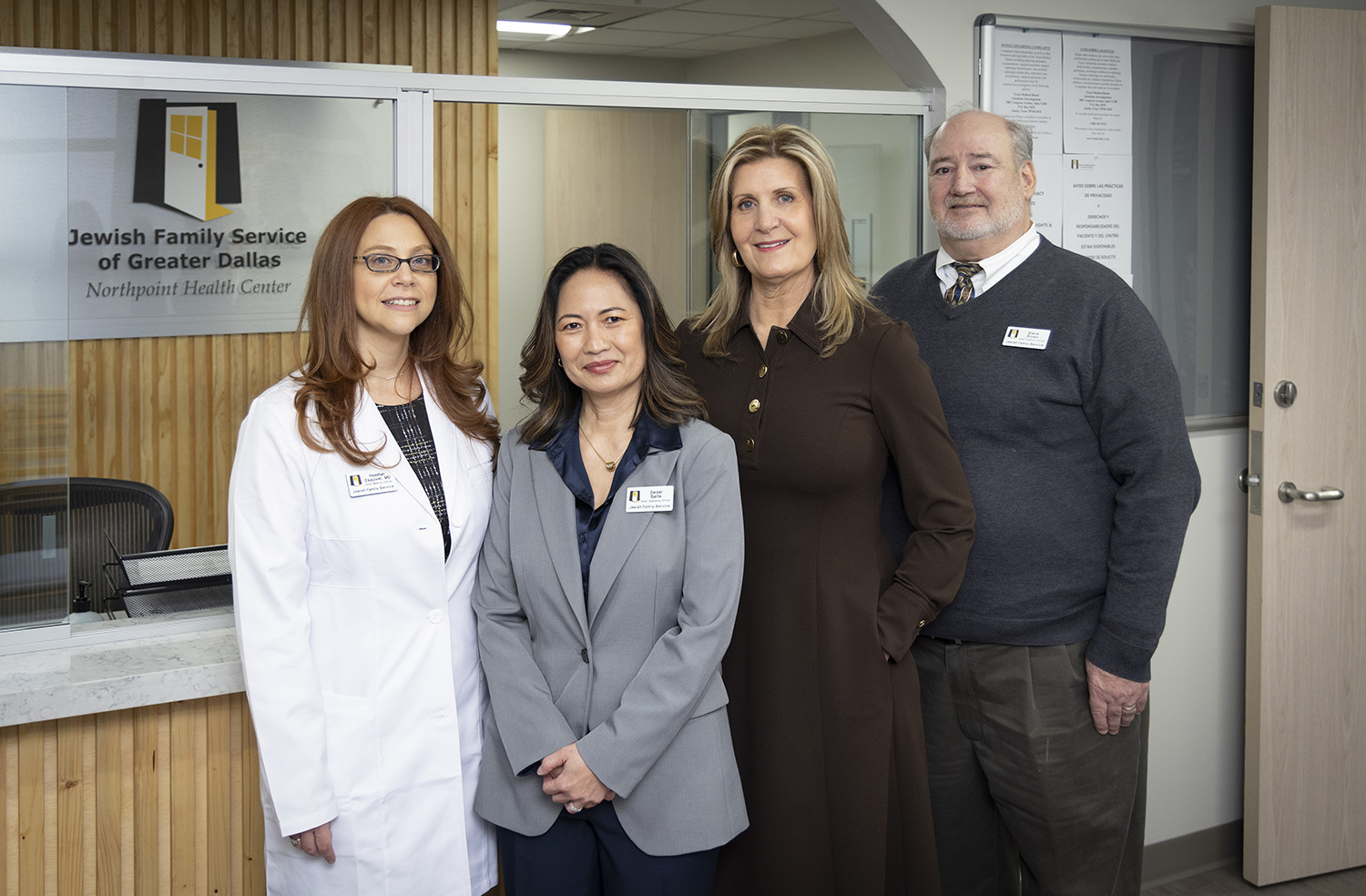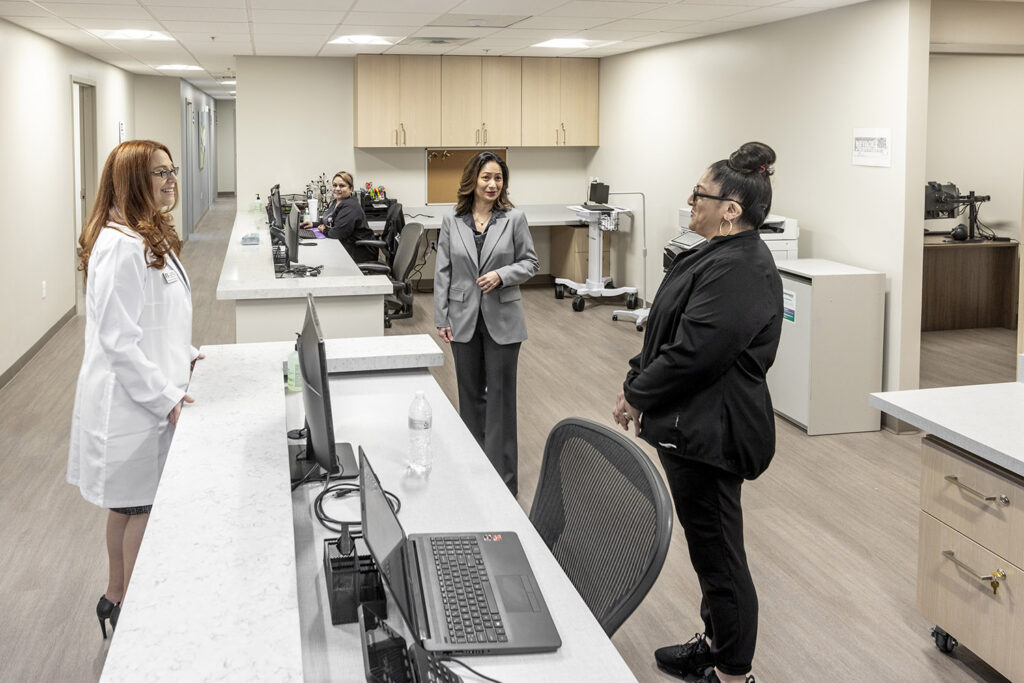Story by Jennie Trejo. Photos provided by Jewish Family Service.

Jewish Family Service of Greater Dallas (JFS) hosted a ribbon-cutting ceremony for its Northpoint Health Center on Thursday, February 29. The 5,500-square-foot facility, located at 12606 Greenville Ave., aims to meet a critical need for health care for low-income neighbors.
Cathy Barker, Chief Executive Officer at JFS, shares that opening the clinic has been a four-year journey wholeheartedly supported by her team. Their holistic approach to serving clients includes nutritional support, job assistance, mental health counseling, and now, critically, physical healthcare.
“There was one missing piece from everything we are already doing under one roof,” Cathy says. “So we were helping people to get nutritionally, economically, and emotionally healthier, but we were missing that physical aspect.”
The clinic location was chosen based on extensive research conducted by JFS, revealing that approximately 793,007 low-income residents in the JFS service area need access to medical providers. Many of these individuals rely on hospital emergency rooms or go without care. Recognizing this gap in its offerings, the agency expanded its services to include primary and preventative care, ensuring that clients receive comprehensive care to improve their overall well-being.
The new center boasts ten examination rooms and dedicated behavioral health and counseling spaces. Primary care providers will offer annual adult and pediatric physicals, cancer screenings, routine women’s and men’s health exams, sick visits, behavioral health, chronic disease management, and other medical services.
Due to the mission to provide a “patient-centered” approach to care, JFS selected Dr. Heather Esquivel as its chief medical officer. With over 14 years in community health, Dr. Esquivel is a board-certified family medicine physician whose career includes providing high-quality healthcare to underserved communities, including preventive medicine, chronic disease management, women’s health, and adolescent medicine. She received her medical degree through Brown University’s program in liberal medical education.
“Part of what made the decision to come to JFS easy is because of their vision of giving whole person care here,” Dr. Esquivel explains. “I’ve always wished that I could accomplish that at my other positions at community health centers.”
In Dr. Esquivel’s experience, organizations typically start with medical services and try to build on that, running into financial barriers and other limitations. But to her, what makes JFS special is that they already have the wraparound services in place, and they do them well.
“JFS has been providing mental health services for decades,” Dr. Esquivel says. “They have 30-plus health specialists right now. I’ve been lucky to have just one in my previous practice. So it’s a whole new world.”
Dr. Esquivel gave an example of seeing a patient who may be in for diabetes medication, but then she learns that they are struggling with grief because of the loss of a loved one, or they are unable to afford healthy food to manage their diabetes and are unsure about where to go for help.
“To be able to say, ‘Oh my gosh, well, my colleagues right here can help you with that,’ is really a godsend. So I was thrilled at the opportunity to join them and offer medical services because of all the other great things I can connect my patients to,” Dr. Esquivel shares.
To reach as many patients as possible, Dr. Esquivel says that JFS has hired a fully bilingual staff that can support patients. It is essential to her to provide languages other than English and Spanish in the practice, so they also use a language line.
“We know we’re in a corridor here where there are many other languages spoken as well,” Dr. Esquivel says. “So it’s really important to me that when we say we are going to help everyone, we can really do that.”

Founded in 1950 to aid those affected by the aftermath of the Holocaust, Jewish Family Service initially focused on providing essential services to the Jewish community, including food, employment assistance, and mental health support. However, as times changed, so did the organization’s mission.
“Throughout history, most of the services we’ve provided had to do with people who may have been refugees or leaving tough situations, and addressing all the things they need,” Cathy says.
According to her, JFS today supports individuals from all walks of life, irrespective of age, ethnicity, gender, socioeconomic status, or religion. The agency’s core values, rooted in Jewish principles of tikkun olam (repairing the world) and compassion, guide its efforts to serve the broader Dallas community.
“When people think of ‘Jewish Family Service,’ they think that we only serve the Jewish community,” Cathy explains. “But what we like to say is that even though we were founded to help Jews then, today we help the broader Dallas community– anyone in need– because of our Jewish values.”
Central to Jewish Family Service’s ethos is the principle of providing quality care with dignity and respect. Rejecting stereotypes of crowded, run-down free clinics, the agency is dedicated to offering professional, high-quality services in an environment that promotes healing and dignity.
“All of us want to go someplace where we are going to receive the best and most professional quality services,” Cathy says. “So we thought, ‘Why wouldn’t the general community, or those who are uninsured, or those on Medicaid or Medicare want any different? Why shouldn’t they have the same level of dignity and respect that the rest of the community has?’”
A variety of financial contributors made the brand-new clinic was made possible. JFS was the first recipient of the North Texas Food Bank Hope for Tomorrow Grant, which was directed toward opening this health center. Cathy also thanks Les and DJ Weisbrod, longtime supporters who saw the potential in an idea and provided funding to make the concept possible.
The project was also backed by thought leaders like Cathy and the JFS Board of Directors, who embarked on an 18-month journey to learn, understand, and evaluate the potential of adding medical services.
“From our research and supporting our community through a pandemic, we knew that less than 5 percent of those who needed access to healthcare (Medicaid, Medicare, uninsured, and underinsured) had a medical home and that 86 percent of clients we surveyed indicated they would use these services if JFS offered them,” Cathy says. “Finally, we knew this model would enable JFS to become financially self-sustainable within three years of opening this clinic.”
Beyond its impact on the Dallas area, Jewish Family Service of Dallas is the first Jewish social service agency in the nation to provide medical services to its clients using this model for expanding services and improving financial sustainability. It could be replicated in many of the 150 Jewish nonprofit human service agencies across the United States. JFS is pursuing status as a Federally Qualified Health Center (FQHC).
Cathy says that there are plenty of ways to get involved. Volunteer opportunities range from doing tours, driving meals to seniors, working the food pantry, and more. Every aspect of the agency, from its clinics to volunteer programs, reflects a commitment to excellence and compassion.
Cathy emphasizes that Jewish Family Service is not exclusive to the Jewish community. While its origins lie in serving Jewish refugees and survivors, the agency has embraced a broader mandate to serve all individuals facing adversity. This commitment to inclusivity is underpinned by a belief in the inherent dignity and worth of every human being.
If you want to learn more about getting involved, you can visit the Jewish Family Service website here. The Northpoint Health Center is open to anyone who calls to schedule an appointment. For more information about the Northpoint Community Health Center, visit www.jfsdallas.org/healthcenter.
Sign up with your email address to receive good stories, events, and volunteer opportunities in your inbox.
Notifications